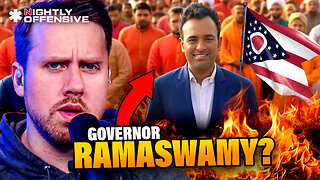Premium Only Content

Ex-CIA agent reveals over 400 journalists work with them.
Ex-CIA agent admits in 1983 they use media to spread propaganda.
-- Former CIA agent, John Stockwell, explained in 1983 how the ClA used propaganda in mainstream media, including fake stories and photos.
--
U.S. Repeals Propaganda Ban, Spreads Government-Made News to Americans
For decades, a so-called anti-propaganda law prevented the U.S. government's mammoth broadcasting arm from delivering programming to American audiences.
By John Hudson
July 14, 2013, 7:06 PM
For decades, a so-called anti-propaganda law prevented the U.S. government’s mammoth broadcasting arm from delivering programming to American audiences. But on July 2, that came silently to an end with the implementation of a new reform passed in January. The result: an unleashing of thousands of hours per week of government-funded radio and TV programs for domestic U.S. consumption in a reform initially criticized as a green light for U.S. domestic propaganda efforts. So what just happened?
Until this month, a vast ocean of U.S. programming produced by the Broadcasting Board of Governors such as Voice of America, Radio Free Europe/Radio Liberty, and the Middle East Broadcasting Networks could only be viewed or listened to at broadcast quality in foreign countries. The programming varies in tone and quality, but its breadth is vast: It’s viewed in more than 100 countries in 61 languages. The topics covered include human rights abuses in Iran, self-immolation in Tibet, human trafficking across Asia, and on-the-ground reporting in Egypt and Iraq.
The restriction of these broadcasts was due to the Smith-Mundt Act, a long-standing piece of legislation that has been amended numerous times over the years, perhaps most consequentially by Arkansas Senator J. William Fulbright. In the 1970s, Fulbright was no friend of VOA and Radio Free Europe, and moved to restrict them from domestic distribution, saying they "should be given the opportunity to take their rightful place in the graveyard of Cold War relics." Fulbright’s amendment to Smith-Mundt was bolstered in 1985 by Nebraska Senator Edward Zorinsky, who argued that such "propaganda" should be kept out of America as to distinguish the U.S. "from the Soviet Union where domestic propaganda is a principal government activity."
Zorinsky and Fulbright sold their amendments on sensible rhetoric: American taxpayers shouldn’t be funding propaganda for American audiences. So did Congress just tear down the American public’s last defense against domestic propaganda?
BBG spokeswoman Lynne Weil insists BBG is not a propaganda outlet, and its flagship services such as VOA "present fair and accurate news."
"They don’t shy away from stories that don’t shed the best light on the United States," she told The Cable. She pointed to the charters of VOA and RFE: "Our journalists provide what many people cannot get locally: uncensored news, responsible discussion, and open debate."
A former U.S. government source with knowledge of the BBG says the organization is no Pravda, but it does advance U.S. interests in more subtle ways. In Somalia, for instance, VOA serves as counterprogramming to outlets peddling anti-American or jihadist sentiment. "Somalis have three options for news," the source said, "word of mouth, al-Shabab, or VOA Somalia."
This partially explains the push to allow BBG broadcasts on local radio stations in the United States. The agency wants to reach diaspora communities, such as St. Paul, Minnesota’s significant Somali expat community. "Those people can get al-Shabab, they can get Russia Today, but they couldn’t get access to their taxpayer-funded news sources like VOA Somalia," the source said. "It was silly."
Lynne added that the reform has a transparency benefit as well. "Now Americans will be able to know more about what they are paying for with their tax dollars — greater transparency is a win-win for all involved," she said. And so with that we have the Smith-Mundt Modernization Act of 2012, which passed as part of the 2013 National Defense Authorization Act, and went into effect this month.
But if anyone needed a reminder of the dangers of domestic propaganda efforts, the past 12 months provided ample reasons. Last year, two USA Today journalists were ensnared in a propaganda campaign after reporting about millions of dollars in back taxes owed by the Pentagon’s top propaganda contractor in Afghanistan. Eventually, one of the co-owners of the firm confessed to creating phony websites and Twitter accounts to smear the journalists anonymously. Additionally, just this month, the Washington Post exposed a counter-propaganda program by the Pentagon that recommended posting comments on a U.S. website run by a Somali expat with readers opposing al-Shabab. "Today, the military is more focused on manipulating news and commentary on the Internet, especially social media, by posting material and images without necessarily claiming ownership," reported the Post.
But for BBG officials, the references to Pentagon propaganda efforts are nauseating, particularly because the Smith-Mundt Act never had anything to do with regulating the Pentagon, a fact that was misunderstood in media reports in the run-up to the passage of new Smith-Mundt reforms in January.
One example included a report by the late BuzzFeed reporter Michael Hastings, who suggested that the Smith-Mundt Modernization Act would open the door to Pentagon propaganda of U.S. audiences. In fact, as amended in 1987, the act only covers portions of the State Department engaged in public diplomacy abroad (i.e. the public diplomacy section of the "R" bureau, and the Broadcasting Board of Governors.)
But the news circulated regardless, much to the displeasure of Rep. Mac Thornberry (R-TX), a sponsor of the Smith-Mundt Modernization Act of 2012. "To me, it’s a fascinating case study in how one blogger was pretty sloppy, not understanding the issue and then it got picked up by Politico‘s Playbook, and you had one level of sloppiness on top of another," Thornberry told The Cable last May. "And once something sensational gets out there, it just spreads like wildfire."
That of course doesn’t leave the BBG off the hook if its content smacks of agitprop. But now that its materials are allowed to be broadcast by local radio stations and TV networks, they won’t be a complete mystery to Americans. "Previously, the legislation had the effect of clouding and hiding this stuff," the former U.S. official told The Cable. "Now we’ll have a better sense: Gee some of this stuff is really good. Or gee some of this stuff is really bad. At least we’ll know now."
above is from: https://foreignpolicy.com/2013/07/14/u-s-repeals-propaganda-ban-spreads-government-made-news-to-americans/
'
American Freedom Radio is back on the air:
http://104.248.64.201:8000
-
 2:11:32
2:11:32
Glenn Greenwald
7 hours agoGlenn From Moscow: Russia Reacts to Trump; Michael Tracey Debates Ukraine War | SYSTEM UPDATE #413
109K48 -
 DVR
DVR
Slightly Offensive
6 hours ago $10.50 earnedGOV. RAMASWAMY? Vivek to import 1 BILLION INDIANS to OHIO | Nightly Offensive
27.5K17 -
 4:51:08
4:51:08
Wahzdee
10 hours agoSniper Elite Then Extraction Games—No Rage Challenge! 🎮🔥 - Tuesday Solos
84.6K3 -
 2:12:58
2:12:58
Robert Gouveia
9 hours agoSenator's Wife EXPOSED! Special Counsel ATTACKS; AP News BLOWN OUT
72.8K41 -
 55:07
55:07
LFA TV
1 day agoDefending the Indefensible | TRUMPET DAILY 2.25.25 7PM
47.7K14 -
 6:09:26
6:09:26
Barry Cunningham
16 hours agoTRUMP DAILY BRIEFING - WATCH WHITE HOUSE PRESS CONFERENCE LIVE! EXECUTIVE ORDERS AND MORE!
133K50 -
 1:46:37
1:46:37
Game On!
10 hours ago $5.57 earnedPUMP THE BRAKES! Checking Today's Sports Betting Lines!
51.6K4 -
 1:27:21
1:27:21
Redacted News
10 hours agoBREAKING! SOMETHING BIG IS HAPPENING AT THE CIA AND FBI RIGHT NOW, AS KASH PATEL CLEANS HOUSE
198K245 -
 1:08:28
1:08:28
In The Litter Box w/ Jewels & Catturd
1 day agoCrenshaw Threatens Tucker | In the Litter Box w/ Jewels & Catturd – Ep. 749 – 2/25/2025
116K57 -
 44:57
44:57
Standpoint with Gabe Groisman
1 day agoWill Byron Donalds Run for Florida Governor? With Congressman Byron Donalds
69.5K9